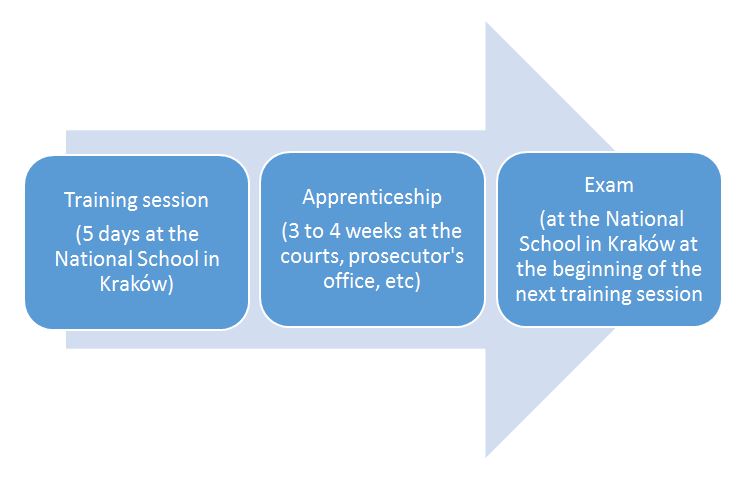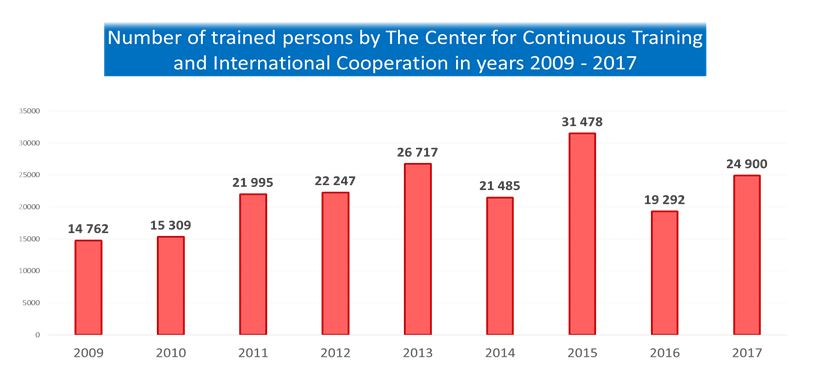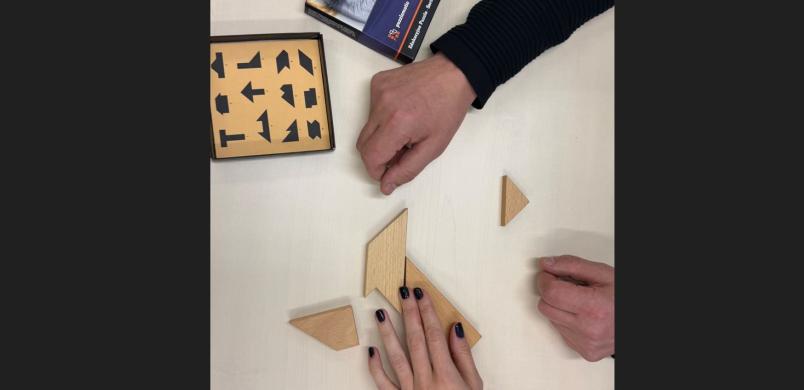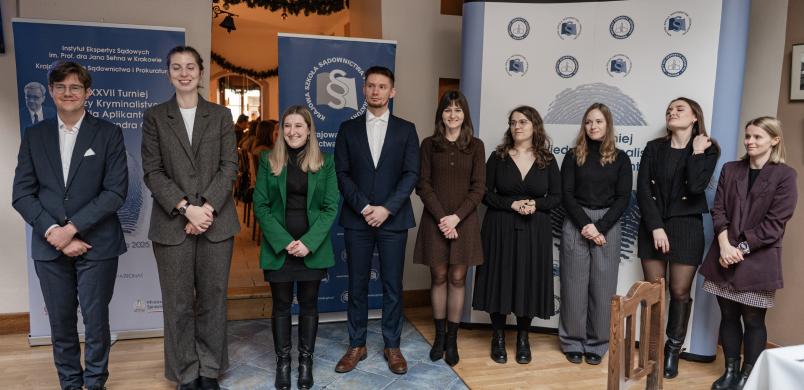National School of Judiciary and Public Prosecution
- ACT ON THE NATIONAL SCHOOL OF JUDICIARY AND PUBLIC PROSECUTION
- LEGAL BACKGROUNDGo to LEGAL BACKGROUND
- MAIN TASKSGo to MAIN TASKS
- BODIES OF THE NATIONAL SCHOOLGo to BODIES OF THE NATIONAL SCHOOL
- STRUCTURE OF THE NATIONAL SCHOOLGo to STRUCTURE OF THE NATIONAL SCHOOL
- INITIAL TRAININGGo to INITIAL TRAINING
- CONTINUOUS TRAINING AND INTERNATIONAL COOPERATIONGo to CONTINUOUS TRAINING AND INTERNATIONAL COOPERATION
- TEACHING AND TRAINING FACILITIESGo to TEACHING AND TRAINING FACILITIES
- CONTACT DETAILSGo to Contact Details
LEGAL BACKGROUND
The National School of Judiciary and Public Prosecution (hereinafter: the National School) established on the basis of the Act of 23 January 2009 on the National School of Judiciary and Public Prosecution possesses a legal entity and serves as the only central institution responsible for the initial training of future judges and prosecutors, as well as the continuing education of court and prosecution staff in Poland.
Acting by the way of ordinance, the Minister of Justice grants the National School its statute, which states structure, organisation, official seat, symbols, taking into account the creation of proper organisational conditions necessary for the correct performance of the School’s objectives.
The National School is supervised by the Minister of Justice with regards of its compliance with legal regulations and the statute.
Its organizational terms and conditions are laid down by the Director of the National School.
The School is largely financed from the portion of the state budget allocated to the Minister of Justice.
Appropriate regulations on public colleges shall apply to the property and finance of the National School accordingly.
MAIN TASKS
The National School is in charge of :
- judicial and prosecutorial training to provide trainees with the indispensable knowledge and practical skills necessary for their future work as judges, judge’s assessors, prosecutors and prosecutor’s assessors;
- training and professional development of judges, judge’s assessors, prosecutors and prosecutor’s assessors in order to improve their specialist knowledge and professional skills;
- training and professional development of court referendaries, judge’s assistants, prosecutor’s assistants and probation officers, as well as other court and prosecution clerks in order to improve their professional knowledge;
- managing analyses and research in order to determine competences and qualifications attributed to positions in courts and prosecution offices which would be used in training activities;
- managing analyses and research in order to determine the training needs of judges, judge’s assessors, prosecutors, prosecutor’s assessors, court referendaries, judge’s assistants, prosecution assistant, probation officers as well as court and prosecution clerks.
The National School undertakes also publishing activity. Within its framework The Quarterly of the National School of Judiciary and Public Prosecution (Kwartalnik) featuring articles written by judges, prosecutors, academics and legal trainers is regularly published. Since 2013 The Quarterly has been listed as scientific journal, as well as the other publishing series, such as: Methodologies (Metodyki), Legal Trainee’s Library (Biblioteka Aplikanta), First Court Calendar (Pierwsza wokanda).
All the above publications are distributed free of charge to courts and prosecution offices, as well as to the Supreme Court, to the General Public Prosecutor’s Office, to the Supreme Administrative Court and to the universities offering law programs.
To realize its objectives the National School is also involved in interinstitutional and international cooperation. In particular the National School cooperates with Polish universities, with research and development units and academic establishments of the Polish Academy of Sciences (PAN), with professional legal organizations and association, as well with European and international judicial training institutions and training organizations.
The tasks of the National School are carried out by its staff, as well as the judges, prosecutors, court referendaries and assistants seconded to the School by the Minister of Justice or the National Public Prosecutor.
BODIES OF THE NATIONAL SCHOOL
Bodies of the National School comprise the Director and the Programme Board.
The Director of the National School is appointed by the Minister of Justice for a five-year term, acting with the advice of the National Council of Judiciary and the National Council of Prosecutors at the General Prosecutor’s Office. The Director may be appointed for two subsequent terms at the most.
The Director manages the activities of the National School and represents it outside.
The Director of the National School is responsible for e.g.:
- outlining organizational regulations for the National School;
- directly supervising the organizational units of the National School;
- performing activities related to labour law;
- outlining the training curriculum for initial legal training;
- drawing up and enforcing annual schedules of training activities;
- outlining and enforcing annual publishing targets;
- preparing and holding recruitment processes for initial legal training, conducting judicial and prosecutorial training, as well organizing professional examinations for judges, prosecutors and referendaries;
- drafting annual statement for the National School and submitting it to the Minister of Justice and to the Programme Board.
The Programme Board consists of the Director of the National School and no more than 12 members appointed by the Minister of Justice, including one member assigned by the President of the Republic of Poland, one by the National Council of Judiciary, one by the National Council of Prosecutors by the General Prosecutor’s Office, one by the First President of the Supreme Court and one by the First President of the Supreme Administrative Court, two members assigned by the Minister of Justice among judges, two members assigned by the General Prosecutor among prosecutors and three members assigned by higher education institutions providing legal education.
The Programme Board is responsible for:
- outlining the general directions of activity for the National School;
- drafting annual training schedules of the National School;
- drafting curricula for initial legal training;
- expressing opinions on candidates for lecturers for the National School;
- expressing opinion on annual publishing targets for the National School;
- passing organizational regulations of the Board,
- expressing opinion on all important issues related with activities of the School
- approving the project of annual report on the activity of the National School presented by the Director of the National School,
- giving opinions on the draft regulation of the Director of the National School regarding the establishment of an individual training process and an individual training course.
STRUCTURE OF THE NATIONAL SCHOOL
The organizational structure of the National School is as follows:
- Center for Judicial Training
- Center for Prosecutorial Training
- Center for Continuous Training and International Cooperation (hereinafter: CCTIC)
- Director’s Office
- Administrative Office
The Centers and the Administrative Office are managed by the Deputy Directors of the National School.
INITIAL TRAINING
The National School of Judiciary and Public Prosecution has enrolled law graduates for initial judicial and prosecutorial training since 2009.
Features of training at the National School:
- a centralized and transparent admission procedure in the form of a two-stage written exam designed to test the applicants' legal knowledge and their ability to apply it in practice,
- an annual enrolment limit determined by the Minister of Justice (2017 – 310 trainees, 2018 – 210 trainees),
- training classes alternate with practice to form training cycles that end with exams designed to test the acquired skills and knowledge,
- practice account for 80% of the apprenticeship,
- training classes are taught on the premises of the National School, while practice are organized all around Poland,
- most classes are taught by judges and prosecutors,
- the entrance exam as well professional examination for judges and prosecutors are managed by committees appointed by the Minister of Justice,
- trainees receive paid scholarships.
Admission to the National School:
The Minister of Justice announces the enrolment for judicial and prosecutorial training, determines admission limits and defines the dates and fees of the entrance exam.
The exam is divided into two stages:
Stage 1:
- a test of knowledge of different areas of the law
Stage 2:
- a written essay testing the skills of legal argumentation, interpretation and qualification
The exam is prepared by judges and prosecutors that make up a jury delegated by the Minister of Justice. The competition is conducted by a special committee composed of judges and prosecutors appointed by the Minister of Justice upon the request of the Director of the National School. The final ranking depends on the total score earned in the two stages of the competition.
The number of law graduates who apply for training at the National School in following years:

| 2009 | 2010 | 2011 | 2012 | 2013 | 2014 | 2015 | 2016 | 2017 | |
|---|---|---|---|---|---|---|---|---|---|
| Copetition applications | 1542 | 1391 | 2170 | 1883 | 1813 | 1872 | 1786 | 1998 | 2389 |
| Participants in the 1st stage | 1467 | 1320 | 1837 | 1674 | 1521 | 1617 | 1436 | 1710 | 2162 |
| Participants in 2nd stage | 945 | 586 | 488 | 385 | 365 | 381 | 305 | 218 | 585 |
| Admitted | 301 | 301 | 200 | 200 | 181 | 181 | 150 | 218 | 310 |
Judicial training and prosecutorial training
Both training courses last 36 months. Trainees attend classes at the National School and complete practice throughout Poland.
The programme is divided into cycles, each of which consists of three elements: a 5-day training session at the National School, several weeks of practice and an exam of knowledge and practical skills that takes place at the beginning of the next training session.

Training is based on curricula drawn up by the Director of the National School and held in groups of 10 to 20 students.
Training sessions, most of which are practical in nature, are held in the form of workshops and rely on state-of-the-art teaching methodologies such as:
- the case method (analysing decisions by the European Court of Human Rights, the European Court of Justice, the Supreme Court and common courts of law),
- working with court and prosecution files,
- analysing and solving cases,
- mock trials.
Classes are taught by judges and prosecutors from all over Poland, as well as professionals from non-legal disciplines. Trainees enjoy free access to teaching resources and legal software.
Great importance is attached to practice, which account for c. 80% of the total training time. After the end of each one-week session at the seat of the National School, trainees are referred for practical internships to various courts, prosecution offices, voivodship administrative courts, police stations, customs and tax offices, remand centres and prisons.
Practice is supervised by judges and prosecutors assigned as personal tutors to individual trainees. A special coordinator ensures that each practicum is conducted correctly and draws up their final evaluation.
Each training cycle ends with an exam designed to test the trainees' ability to prepare a trial decision or pleading based on court or preliminary proceedings files. To successfully complete the programme, trainees must earn a passing grade in all exams and practice.
In the last month of training, trainees sit a professional examination for judges and prosecutors.
Once they have completed the programme, judicial and prosecutorial trainees can apply to become judge’s assessors and prosecutor’s assessors, respectively.
Additional skill and competence training:
- language classes focusing on legal terminology,
- additional e-learning courses delivered via the National School’s e-learning platform,
- international exchange programmes organized by, e.g. the European Judicial Training Network (EJTN) within the framework of the AIAKOS programme,
- international THEMIS competition for apprentices organized by the EJTN – achievements of the National School teams:
- 2017 – 2nd prize,
- 2015 – 3rd prize,
- 2013 – 1st prize,
- Forensic Knowledge Tournament,
- Speech Contest,
- sports activities.
The National School has its own teaching and hotel facilities located in Kraków’s centre, in the close vicinity of a number of court and prosecutors’ office buildings. For periods when sessions are held, trainees may stay in single rooms with bathrooms in The Legal Trainee’s House that are reserved specifically for them.
CONTINUOS TRAINING AND INTERNATIONAL COOPERATION
The Centre of Continuous Training and International Cooperation (hereinafter: the CCTIC) realizes the statutory objectives of the National School in the area of legal continuous training of judges, judge’s assessors, prosecutors and prosecutor’s assessors, court referendaries, judge’s assistants, prosecutor’s assistants, probation officers and court and prosecution clerks, as well in the area of the international cooperation.
The CCTIC shall comprise four departments:
- Continuous Training Department
- International Cooperation Department
- Research and Analysis Department
- Grants and Funds Department
The main tasks of CCTIC shall be presented as follows:
- training and professional development of judges, judge’s assessors, prosecutors and prosecutor’s assessors in order to improve their specialist knowledge and professional skills;
- training and professional development of court referendaries, judge’s assistants, prosecution assistant, probation officers as well as court and prosecution clerks to improve their professional qualifications;
- managing analyses and research in order to determine competences and qualifications attributed to positions in courts and prosecution’s offices which would be used in training activities;
- managing analyses and research in order to determine the training needs of judges, judge’s assessors, prosecutors, prosecutor’s assessors, court referendaries, judge’s assistants, prosecution assistant, probation officers as well as court and prosecution clerks.
- coordinating training schemes organised by courts and prosecutor’s office
- acquiring and using of aid funds intended for financing above tasks
- international cooperation
- joint-action with basic organisational units of colleges which conduct training in the legal faculty, research and development units and academic units of Polish Academy of Sciences, with regard to training activities and other form of professional development
- preparing and organising conferences, symposiums and seminars
- performing other duties related to professional development court and prosecutor’s office employees, as well as the needs of the judiciary and prosecutor's office indicated by the Minister of Justice and National Prosecutor.
The Centre is located at the heart of Lublin, in the 18th-century Morski Palace. In 2011-2015, the palace was restored and adapted for its new purpose. The Center can accommodate up to 310 participants. There is an auditorium for 178 people with special equipment for simultaneous interpreting, as well lecture halls and workshop labs, all with modern technical equipment.
The training facilities are accessible to people with disabilities.
The Centre focuses on training activities, organizing an average of approximately 500 – 600 training events every year, attended by more than 22,000 participants.

| Year | Number of trained persons |
|---|---|
| 2009 | 14 762 |
| 2010 | 15 309 |
| 2011 | 21 995 |
| 2012 | 22 247 |
| 2013 | 26 717 |
| 2014 | 21 485 |
| 2015 | 31 478 |
| 2016 | 19 292 |
| 2017 | 24 900 |
Continuous Training Department
The training offer covers various legal topics, in particular the latest or most problematic legal regulations (e.g. prevention of cross border crime, tax-fraud, cybercrime, EU law, human rights law, legal aspects of obtaining and using biological traces as evidence), as well as other issues not directly related to law (e.g. interpersonal communication, public presentations, management in the justice system, handling stress and counteracting professional burnout, professional ethics, and also issues related to medicine, economy, and sociology).
Various teaching methodologies are employed, namely seminars, workshops, case studies, conferences, e-learning, all based on original curricula designed by the Centre in cooperation with the lecturers of the National School.
All training courses are conducted by the National School’s lecturers. The National School’s lecturer can be a judge, a prosecutor, or an academic teacher, and also a person that possesses expert knowledge in the specific subject matter, as well as retired judge or prosecutor, whose knowledge and professional experience can guarantee a good performance to the exercise of this function. The Programme Board is responsible for expressing opinion on candidates for lecturers for the National School; The teaching staff currently consists of several hundred people.
The CCTIC has also wide range of on-line training on offer, namely the National School’s
e-learning platform provides 31 trainings in three thematic areas:
- soft training,
- specialized training,
- training on law in English, German and French
The National School’s website contains also links to the on-line courses offered by The Academy of European Law (ERA), the European Judicial Training Network (EJTN) and HELP Programme.
International Cooperation Department
International cooperation is an essential element of the National School’s activities and involves the coordination of foreign training, internships and exchange programmes for Polish participants, as well as the organization of international events and training in Poland.
The goal of these events is to improve knowledge of European legal instruments, to develop knowledge of linguistic skills and to build mutual trust between judges and prosecutors in Europe.
The National School cooperates closely with judicial training organizations in Europe e.g. in the framework of the Vysehrad Group (Czech Republic, Slovak Republic, Hungary), as well as international institutions and training organizations such as the European Judicial Training Network (EJTN), the Academy of European Law (ERA), the European Institute of Public Administration (EIPA), The European Programme for Human Rights Education for Legal Professionals (Program HELP) and the International Organization for Judicial Training (IOJT).
Research and Analysis Department
The Research and Analysis Department is engaged in the current and prospective training needs analysis. It also conducts research into the skill profiles of justice system staff for the purposes of future training, as well as designs initial and continuous training assessment tools. The Research and Analysis Department also collects and analyses statistical data regarding the National School’s activity in the field of initial and continuous training.
Grants and Funds Department
The Centre for Continuous Training and International Cooperation is also actively involved in acquiring and effective using of aid funds to finance its training activities. In this framework, CCTIC undertakes cooperation with institutions working in the field of EU assistance funds, as well as the Norwegian funds. Last years, the following projects were implemented thanks to the above-mentioned funds:
- Education in management of time and costs of court proceedings – case management
- Organized cross-border crime
- Cross-border crime related to trade
Combating and Preventing Cross- Border and Organized Crime
TEACHING AND TRAINING FACILITIES
The Centre for Judicial Training and the Centre for Prosecutorial Training based in Kraków :
- auditorium for 150-170 people,
- lecture halls and classrooms,
- mock trial room
- the Legal Trainee’s House, located in the neighbourhood of the Centre for Judicial Training and the Centre for Prosecutorial Training:
- 200 beds in single and double rooms with individual bathrooms,
- fitness room, children's room, kitchen,
- canteen
The Centre for Continuous Training and International Cooperation based in Lublin:
- auditorium for 178 people,
- lecture halls and classrooms,
The Training Centre in Dębe, near Warsaw, established to provide accommodation and catering services and to organize conferences, training sessions, symposia, and other training and entertainment group events.
- lecture halls and classrooms,
- canteen.
CONTACT DETAILS
National School of Judiciary and Public Prosecution
Przy Rondzie Str. 5
31-547 Kraków
Director's Office
tel. +48 12 617 96 14, +48 12 617 96 12
e-mail: [email protected]
Centre for Judicial Training
tel. +48 12 617 94 20
e-mail: [email protected]
Centre for Prosecutorial Training
tel. +48 12 617 96 39
e-mail: [email protected]
Administrative Office
tel. +48 12 617 94 30
e-mail: [email protected]
Centre for Continuous Training and International Cooperation
Krakowskie Przedmieście Str. 62
20-076 Lublin
tel. +48 81 440 87 10
e-mail: [email protected]



